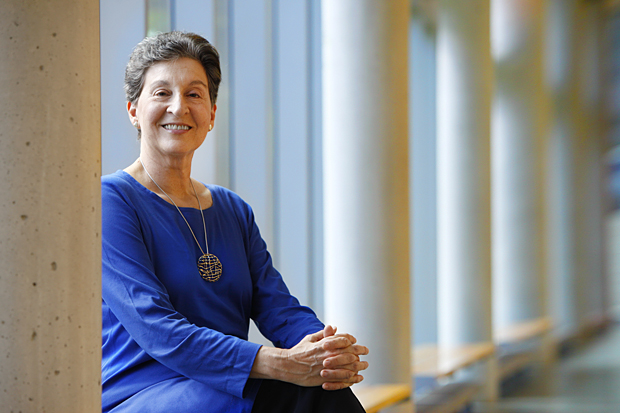Prof. Brooten to research early enslaved women
Year's work is supported by National Endowment for the Humanities grant
 Photo/Mike Lovett
Photo/Mike LovettProfessor Bernadette Brooten
This year Brooten, the Robert and Myra Kraft and Jacob Hiatt Professor of Christian Studies, is a visiting scholar at the Harvard Divinity School's Women's Studies in Religion Program. She received a National Endowment for the Humanities grant for this academic year to research early Christian women who were enslaved or who were slaveholders from the first to fourth centuries.
Why is it important that men and women of today learn about this previously unstudied territory?
“Slavery has been part of our lives for most of our history,” says Brooten, who is also a professor of Classical Studies; Women's and Gender Studies and Religious Studies; and director of the Feminist Sexual Ethics Project. “Christianity, Judaism and Islam tolerated slavery for most of its history and the habits of slavery are deeply entrenched in our thinking. In order to overcome them, we need to see how deep they are in our history and our habits of thought.”
Brooten says she will be looking at the ethical challenges faced by enslaved women in early Christianity to better understand the perspective of the most marginalized. For example, celibacy was an ideal within early Christianity; the idea of keeping one’s body pure and holy for Christ. Elite women were able to honor that if they wished but Brooten questions what few scholars have asked: Could enslaved women also make that choice?
She hypothesizes probably not very often as owners wanted enslaved women to give birth to ensure further enslaved labor.
Brooten’s interest in the less-researched areas of women's studies began when she was a young student studying in Germany in the early 1970’s.
“Our professors told us that there was nothing to know about women in Christianity that we didn’t already know,” says Brooten. “The few of us women who were allowed to study theology at that time were very excited to find out more. We felt that if we looked hard enough we were sure that we could learn new things that weren’t already known.”
The first article that she wrote was about a woman in the New Testament who was called an apostle. It was done partly in response to a Vatican declaration on the ordination of women that declared they could not be validly ordained because Jesus had not appointed female apostles.
“That period of my studies was one of detective work, challenging religious authority and claiming a place for women in religion, which meant also claiming a place in the history of religion,” says Brooten.
She then went on to study Judaism, writing about women leaders in ancient synagogues, some of whom were slave holders. Brooten says she had always viewed those women as leaders who broke gender roles. She had not looked at how, in some cases, enslaved women enabled female leaders in Judaism, Christianity, and other Graeco-Roman religions to succeed.
“Now I’m looking at those whose voices were even more silenced than those of the women leaders were,” says Brooten. “I’m looking at a category of women that had been there all along but had gone unnoticed.”
Brooten says she will examine how the institution of slavery affected enslaved girls and women, those at risk of enslavement and slaveholding women. She will document how the early Christian majority decision to tolerate slavery, including the enslavement of fellow Christians, and to condemn those who encouraged enslaved persons to flee from their owners shaped teachings on marriage, fidelity, chastity, and celibacy.
Brooten says that her methodological framework will be intersectionality, a widely adopted and debated theory developed by critical legal theorist Kimberlé Crenshaw, who argued that considering race, gender and class separately obscures aspects of the lives of women of color. Brooten's own research grows out of the Brandeis Feminist Sexual Ethics Project, which she directs and which focuses on tracing the relationship between slavery and religious teachings about sexual ethics and marriage in Judaism, Christianity and Islam. Her knowledge of ancient Greek, Latin, and Hebrew means that she can draw upon a broad range of ancient Mediterranean sources to help understand early writings.
Brooten will also investigate how the use of women as wet-nurses fit into early Christian ethical reflections on sexual behavior, gender and the body. This common practice, she says, provides insight into attempts to control enslaved women’s sexual lives and bodies.
“Today, when slavery is illegal and women’s rights have advanced, we can better recognize past victimization, cruelty, resilience, and survival,” says Brooten. “This enables more critical reflection on the values that originated in slaveholding cultures.”
Categories: Humanities and Social Sciences, Research






